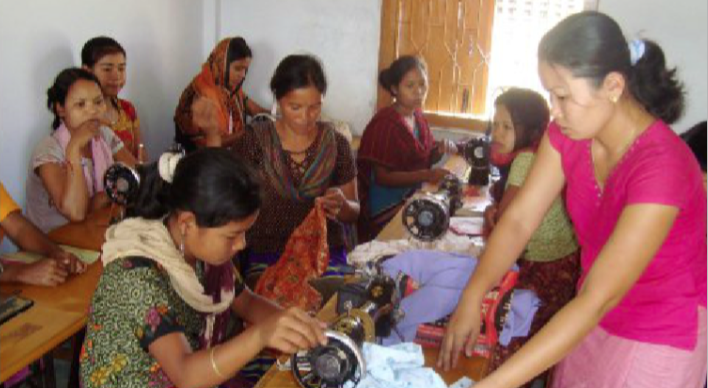Context: Youth unemployment is a serious challenge in Bangladesh, particularly so for young women who are at a significant disadvantage compared to their male counterparts. For example, the unemployment rate for young women is 22.9 per cent compared to only 6.2 per cent for young men. Similarly, with regards to labour force participation, 64.3 per cent of male youth are employed versus 14.9 per cent of females. The gender contrast is particularly stark when looking at the share of youth who are Not Employment nor in Education or Training (NEET): 65.7 per cent for young women and 12.7 per cent for young men. Key reasons for the high rates of unemployment are a lack of job creation and appropriate training. As a result, nearly two thirds of youth in Bangladesh are underemployed. Entrepreneurship offers the potential of creating new jobs for young people, but in Bangladesh few young people view it as a viable option. Connected to this are restricted access to financial services such as credit, and the absence of entrepreneurial advisory services.
Implementation of programme/ initiative: HOPE’87 (Hundreds of Original Projects for Employment) is an Austrian NGO that supports youth employment initiatives worldwide in cooperation with a number of development organizations including UN agencies, the European Commission, the Aga Khan Foundation, Austrian Development Cooperation, the Japan International Cooperation Agency and several international NGOs.
The mission of HOPE’87, which started its activities in Bangladesh in 1990, is to create self-employment opportunities for unemployed youth through technical skills training and financial assistance. HOPE’87-Bangladesh encourages former trainees to get involved in voluntary community development activities and also liaise between trainees with employers, both in Bangladesh and abroad. In addition, HOPE’87-Bangladesh runs projects on education, health care and emergency responses to natural disasters.
HOPE’87-Bangladesh has implemented several successful youth employment projects. For instance, between 2003 and 2008, the Community Skill Development Center (CSDC) provided skills training for unemployed youth in Old Dhaka. Until 2014, and in cooperation with the local NGO TOYMU, the Education, Training and Self-employment Programme (ETSEP) provided skills training for unemployed tribal youth in a remote area in south-eastern Bangladesh. In 2001, HOPE’87-Bangladesh started the HOPE Technical Training Centre (HTTC) in Old Dhaka, currently supported by ILO and affiliated to the Bangladesh Technical Education Board. The HTTC provides technical and skills training to working children and unemployed youth for a number of skilled professions. HOPE’87-Bangladesh has also implemented a “Mobile Training” project where a trainer conducts training courses in a remote village 1-2 months before moving to another village.
Main challenges: HOPE’87-Bangladesh points out at least three issues during the implementation of its projects, particularly in rural areas. First, although in 2013 some 31.7 per cent of employed youth in Bangladesh were self-employed, many were still unaware of the wide range of possibilities for setting up and expanding their own small and microenterprises. A second group of issues relate to logistics and infrastructure at the location of enterprises, such as a lack of transportation or unavailability of water. Lastly, although HOPE’87-Bangladesh is affiliated with the Bangladesh Technical Education Board, coordination in implementing its projects with local governments has room for improvement.
Results achieved: The 54 youth that graduated at the CSDC during the project period found employment in the country or abroad at the end of their training. The ETSEP has provided training to rural youth, particularly women, in a diversity of trades. For instance, 240 participants were trained on poultry and cow rearing, 900 on vegetable gardening, 800 on weaving and tailoring, and 222 on electronics, welding, carpentry, computing and masonry. The programme disbursed grants of up to the equivalent of US$250 to selected participants for the start up of self-employment initiatives and all of these went on to successfully run income generation business in their villages, other parts of Bangladesh and even abroad. The HTTC has trained over 4,200 young women and men, mainly on computing and tailoring, who, after graduation, got employment in the country or abroad.
Moving Forward: In the context of the 2030 Agenda for Sustainable Development and the Sustainable Development Goals, HOPE’87 has stressed the need to tackle not only youth unemployment but also related social and economic consequences. Therefore, in addition to its technical training and financial assistance projects, HOPE’87 will continue to support other projects aiming at improving health and education. For instance, most technical skills training courses now include a disaster preparedness training component.
HOPE’87 plans to strengthen community-based initiatives in the area of employment, health and education. Moreover, the organization intends to increase its advocacy work on different social and political levels.
Replicability: HOPE’87’s approach to addressing unemployment through both technical training (residential and mobile) and financial assistance has been replicated across the 12 countries where it now operates. Its success lies in a number of features. For instance, HOPE’87 projects highlight two issues that are important to ensure sustainability. First, the need for community involvement in all training activities; most HOPE’87 projects engage local NGOs in their implementation. Second, training courses should respond to the needs of the local market (market-driven and needs-based). HOPE’87 exchanges the lessons learned from its projects, not only among its country offices but also by openly sharing them with others, thus facilitating replicability and adaptation to different conditions.
References:
Background Information on Bangladesh school-to-work transition. Bangladesh School-to-work Transition 2013 Survey (2016). Bangladesh Bureau of Statistics and International Labor Organization (ILO).
http://www.ilo.org/wcmsp5/groups/public/—ed_emp/documents/publication/wcms_537748.pdf
HOPE87 official website: http://www.hope87.at/
HOPE87-Bangladesh official website: http://www.hope87bd.org/about%20us.html
Acknowledgments:
This good practice was kindly prepared by Dr. Antonio Postigo
Project Details
Date: February 16, 2017
